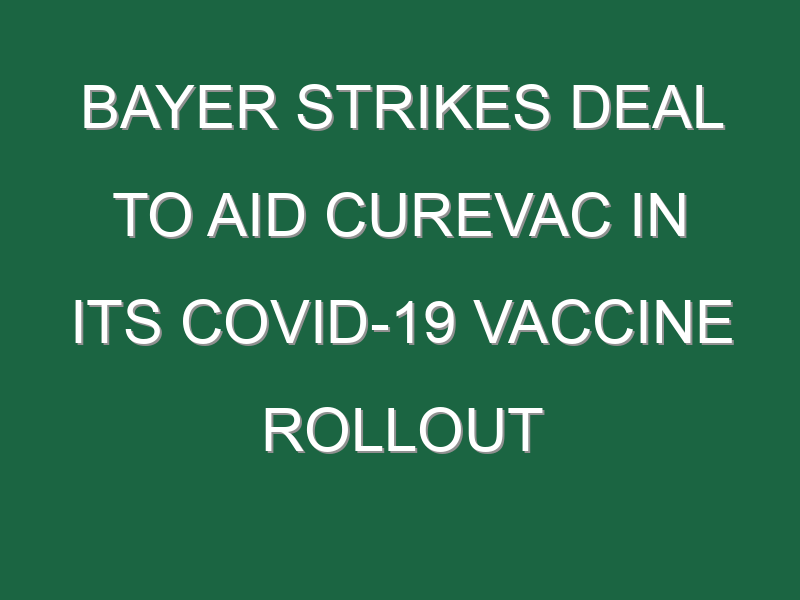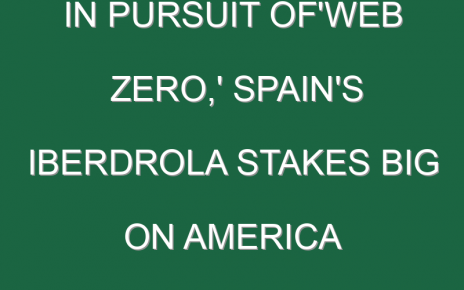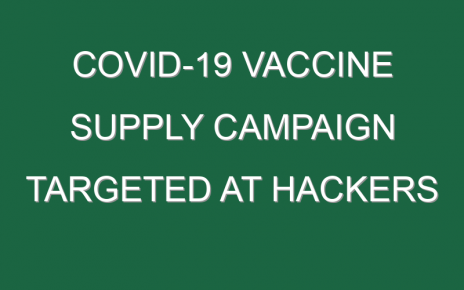The German biopharma firm CureVac has announced a tie-up with the country’s biggest pharmaceutical beast, Bayer, for the development and supply of CureVac’s candidate COVID-19 vaccine.
The companies did not disclose the financial terms of the deal. Bayer’s stock jumped more than 2% on the news Thursday morning.
The collaboration and services agreement should aid the supply of “several hundred million” vaccine doses, the companies said. CureVac said in November that it intends to produce up to 300 million doses this year, and up to 600 million doses in 2022.
Subscribe to The Capsule, a daily brief monitoring advances in health care and biopharma, delivered free to your inbox.
This is all a speculative plan at the moment, given that CureVac’s CVnCoV candidate vaccine—based on similar messenger RNA (mRNA) technology to coronavirus vaccines from Pfizer/BioNTech and Moderna—is still in its large-scale testing phase, the results of which will indicate how effective it is. Following that, regulatory approval would be needed before distribution could begin.
Bayer told Fortune on Thursday that the first results should be available this quarter, with distribution hopefully commencing in Q2.
Joining forces
“Building on the positive data we have seen so far with CVnCoV, we now also have another strong partner on our side to get the vaccine to the people who need it following the receipt of the requisite regulatory approvals,” CureVac CEO Franz-Werner Haas said in a Thursday statement.
“We are highly committed to making our capabilities and networks available to help end this pandemic,” said Stefan Oelrich, head of Bayer’s pharma division. He referred to CureVac as “a leader in mRNA technology.”
CureVac, a previously little-known outfit, grabbed headlines last March when it became the subject of a tug-of-war between President Donald Trump and the German government. Trump was reported to have offered $1 billion to ensure CureVac’s vaccine became exclusively available to the U.S. A political firestorm followed in Germany and the European Commission swiftly responded with an $99 million line of credit for the company.
Although CureVac denied the report of Trump’s offer, CEO Daniel Menichella stepped down days later. CureVac went on to list on the Nasdaq in August.
Bayer is significantly larger than its new partner, with around 104,000 employees to CureVac’s 500-plus. With CureVac developing the product itself, Bayer will help with supply chain issue, regulatory affairs, clinical operations and other elements.
Under the terms of their deal, CureVac would have the right to apply for the vaccine’s marketing license within the EU and other European countries including the U.K., Switzerland, Iceland, Norway and Liechtenstein. Bayer is retaining options to front the marketing license process in some countries outside Europe, though there is not yet agreement as to which countries might be included, the company told Fortune.
CureVac has already taken other partners on board as it prepares for production—Germany’s Wacker Chemie, to manufacture the active substance in the vaccine, and France’s Fareva to “fill and finish” the vials.
Boosting supply
The push comes as many European countries, including Germany, debate whether the vaccine rollout is going quickly enough.
There has been a fair amount of criticism for the European Commission, which has managed collective procurement on behalf of EU members, and it is certainly the case that the European approval process is moving more slowly than those in the U.S. and U.K. The European Medicines Agency (EMA) and the Commission only green-lit the second vaccine, Moderna’s, on Wednesday.
However, the problem is also largely down to production limits.
BioNTech and Pfizer, whose vaccine was the first to gain EU approval, are putting the finishing touches on a new German factory—in the Hessian university town of Marburg—that should be ready to go in February. German Health Minister Jens Spahn said Wednesday that the new facility would “massively” increase vaccine availability in Europe.
German Chancellor Angela Merkel also told Russian President Vladimir Putin this week that she is “open to the idea” of manufacturing Russia’s Sputnik V vaccine in European manufacturing facilities—though only if it gains EMA approval.
Sputnik V is not one of the vaccines for which the Commission has already signed (controversially secretive) procurement agreements. CureVac is on the list—the Commission has already secured up to 405 million doses of its potential vaccine.
The Commission is also trying to double its existing order for 300 million Pfizer-BioNTech doses. It has an order in for 160 million Moderna doses, and—pending regulatory approval—has also secured up to 400 million Oxford-AstraZeneca doses, up to 300 million Sanofi-GSK doses (though those won’t materialize until the end of 2021, if ever), up to 400 million Johnson & Johnson doses, and possibly up to 200 million Novavax doses.
More health care and Big Pharma coverage from Fortune:
- The biggest conspiracy theories of 2020 (and why they won’t die)
- Timeline: From the first coronavirus cases to the first vaccinations
- Trump hyped Verily’s coronavirus testing tool. It led to less than 1% of all tests in 2020
- Commentary: Cracking the code of biological aging could solve America’s health care crisis
- Data delays aren’t slowing the global rollout of a Chinese COVID-19 vaccine





